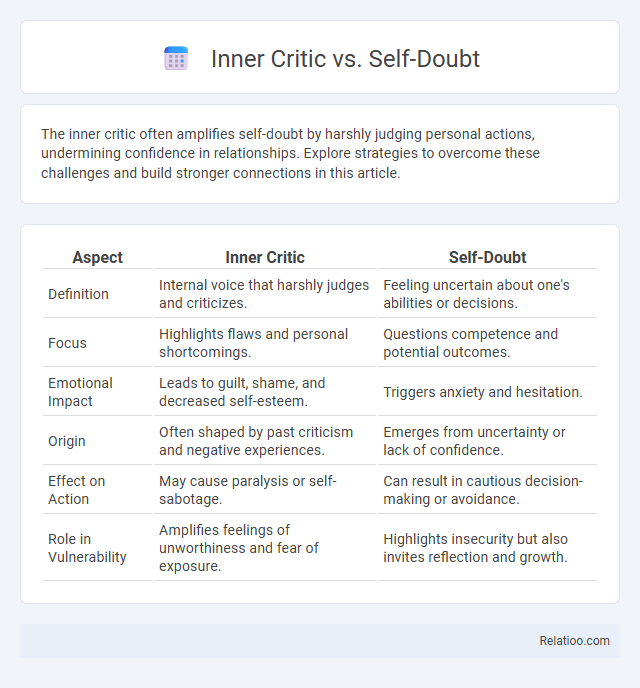The inner critic often amplifies self-doubt by harshly judging personal actions, undermining confidence in relationships. Explore strategies to overcome these challenges and build stronger connections in this article.
Table of Comparison
| Aspect | Inner Critic | Self-Doubt |
|---|---|---|
| Definition | Internal voice that harshly judges and criticizes. | Feeling uncertain about one's abilities or decisions. |
| Focus | Highlights flaws and personal shortcomings. | Questions competence and potential outcomes. |
| Emotional Impact | Leads to guilt, shame, and decreased self-esteem. | Triggers anxiety and hesitation. |
| Origin | Often shaped by past criticism and negative experiences. | Emerges from uncertainty or lack of confidence. |
| Effect on Action | May cause paralysis or self-sabotage. | Can result in cautious decision-making or avoidance. |
| Role in Vulnerability | Amplifies feelings of unworthiness and fear of exposure. | Highlights insecurity but also invites reflection and growth. |
Understanding the Inner Critic: Definition and Origins
The inner critic is a psychological construct representing an internal voice that judges and evaluates one's actions and thoughts, often rooted in early life experiences and social conditioning. Unlike general self-doubt, which is a temporary feeling of uncertainty, the inner critic persistently undermines self-worth through negative self-talk and internalized beliefs. Understanding its origins in childhood messages and cultural influences helps address its impact on mental health and fosters self-compassion.
What Is Self-Doubt? Key Characteristics
Self-doubt is the persistent uncertainty about one's abilities, decisions, or worth, often leading to hesitation and decreased confidence. Key characteristics include negative self-talk, fear of failure, and constant second-guessing. Unlike the inner critic, which can be a harsh internal voice aimed at improvement or self-punishment, self-doubt primarily centers on uncertainty and lack of self-assurance.
Inner Critic vs Self-Doubt: Core Differences
The inner critic is a persistent, internal voice that harshly judges and diminishes self-worth, often stemming from deep-rooted fears and insecurities, whereas self-doubt is a temporary feeling of uncertainty about specific abilities or decisions. While the inner critic attacks the overall self-concept and identity, self-doubt usually revolves around particular tasks or situations and can motivate self-improvement. Understanding the inner critic as a chronic negative pattern and self-doubt as a situational hesitation is key to addressing these psychological challenges effectively.
Signs You’re Facing Your Inner Critic
Signs you're facing your inner critic include persistent negative self-talk that undermines your confidence and exaggerates your perceived flaws. You may experience intense feelings of unworthiness, perfectionism, or fear of failure that hold you back from pursuing goals. Recognizing these patterns helps you distinguish the inner critic from general self-doubt, allowing you to address the root causes impacting your mindset and growth.
Recognizing Symptoms of Self-Doubt
Recognizing symptoms of self-doubt involves noticing persistent feelings of insecurity, hesitation, and fear of failure that undermine Your confidence and decision-making abilities. Unlike the inner critic, which actively harshly judges and criticizes Your actions, self-doubt manifests as a lingering uncertainty that erodes motivation and self-esteem. Identifying these symptoms early enables targeted strategies to manage self-doubt and reduce the damaging impact of the inner critic on Your mental well-being.
How the Inner Critic Forms: From Childhood to Adulthood
The inner critic forms through early childhood experiences, where critical or unsupportive messages from caregivers shape your self-perception and belief systems. These internalized voices evolve into persistent self-judgments in adulthood, often magnified by stress or failure. Unlike self-doubt, which is situational and temporary, the inner critic consistently undermines your confidence by reinforcing negative core beliefs formed during developmental years.
The Impact of Self-Doubt on Daily Life
Self-doubt can significantly influence your daily life by undermining confidence, leading to hesitation in decision-making and increased stress levels. Unlike the inner critic, which often issues harsh judgments, self-doubt creates pervasive uncertainty that affects productivity and personal growth. Addressing self-doubt enables improved mental clarity, stronger emotional resilience, and more assertive actions.
Strategies to Silence Your Inner Critic
Silencing your inner critic requires targeted strategies such as cognitive restructuring, which involves challenging negative thoughts and replacing them with balanced affirmations. Mindfulness practices help increase awareness of self-critical patterns, allowing you to disengage from automatic negative judgments. Developing self-compassion fosters a supportive internal dialogue, reducing self-doubt and diminishing the power of your inner critic.
Building Confidence to Overcome Self-Doubt
Building confidence to overcome self-doubt involves recognizing the distinct roles of the inner critic and self-doubt in shaping one's mindset. The inner critic often voices harsh judgments and perfectionistic standards, while self-doubt triggers uncertainty and hesitation in decision-making. By practicing self-compassion, reframing negative thoughts, and focusing on personal strengths, individuals can weaken the inner critic's influence and cultivate resilient confidence.
Cultivating Self-Compassion for Lasting Change
The inner critic often amplifies self-doubt by harshly judging your actions, hindering personal growth and well-being. Cultivating self-compassion involves recognizing these negative thought patterns without self-judgment, creating a supportive inner dialogue that fosters resilience. By embracing kindness toward yourself, lasting change becomes possible as you transform criticism into encouragement and motivation.

Infographic: Inner critic vs Self-doubt
 relatioo.com
relatioo.com